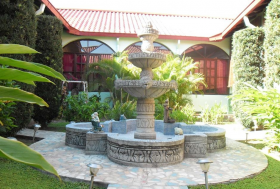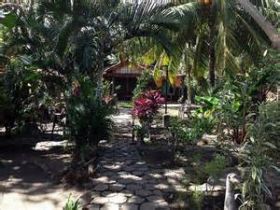What are the home mortgages like in Nicaragua? How long are home mortgage terms and how much down payment is required?
Mike Cobb - ECI Development
Getting a mortgage in Nicaragua is challenging. Caye Bank in Belize will provide 50% LTV (“loan to value”) on a 10 year term. Rates are high by U.S. standards and vary based on currency type. Swiss Franc loans are 4.5%, Canadian Dollar 8.5%, and U.S. dollar at 11.5% as of Nov 2013.
Getting a mortgage in Nicaragua is challenging. Caye Bank in Belize will provide 50% LTV (“loan to value”) on a 10 year term. Rates are high by U.S. standards and vary based on currency type. Swiss Franc loans are 4.5%, Canadian Dollar 8.5%, and U.S. dollar at 11.5% as of Nov 2013.
Posted January 19, 2014
Carlos Roman Gutierrez Solis - Casa Granada Properties
Generally, the down payment of a home mortgage in Nicaragua is 20% of the appraisal amount. The bank does their own appraisal through a third party company. You will pay 20% and the bank will loan you the 80%. If you give more than the required down payment, that is better. They give you 15 to 20 years to pay off the loan. The interest rate is currently at 9.5%. That is only for buying a house.
If you are buying a land without a house on it, the...
Generally, the down payment of a home mortgage in Nicaragua is 20% of the appraisal amount. The bank does their own appraisal through a third party company. You will pay 20% and the bank will loan you the 80%. If you give more than the required down payment, that is better. They give you 15 to 20 years to pay off the loan. The interest rate is currently at 9.5%. That is only for buying a house.
If you are buying a land without a house on it, the mortgage terms and the interest rate is different. If you buy an empty lot, the mortgage term is only 5 years and the interest rate is at 11.5%. It does not matter if you are American or Nicaraguan; the terms are the same.
Posted December 13, 2014
Frank Martínez

Home mortgages are the most secure business for the local banks in Nicaragua. They only have about 3% delinquency rate, so 97% of the people pay on time. Banks give you up to 25 years to pay what is left after the 10% to 40% down payment. For example, if the house is below US $100,000 then the bank will ask for 10%. The more expensive the house, the higher the down payment. This is all for Nicaraguans.
Foreigners can go to Nicaraguan banks and have the bank finance...
Foreigners can go to Nicaraguan banks and have the bank finance...

Home mortgages are the most secure business for the local banks in Nicaragua. They only have about 3% delinquency rate, so 97% of the people pay on time. Banks give you up to 25 years to pay what is left after the 10% to 40% down payment. For example, if the house is below US $100,000 then the bank will ask for 10%. The more expensive the house, the higher the down payment. This is all for Nicaraguans.
Foreigners can go to Nicaraguan banks and have the bank finance their Nicaraguan house. Banks ask for the down payment, which is half of the value of the house and ask foreigners for a local cosigner. A local cosigner is someone who would answer in case you don’t comply with the notes, or with the payments. A cosigner can be anybody who knows you. It is not difficult to get a cosigner. First of all, there are not many foreigners asking for loans here. Most foreigners pay cash for their property.
For those buying a house who are between 50 to 60 years old, their mortgage payment can go as long as 10 years. The length of the mortgage payment depends on the age of the person borrowing the money. The older the person, the less amount of years that they pay.
Foreigners can go to Nicaraguan banks and have the bank finance their Nicaraguan house. Banks ask for the down payment, which is half of the value of the house and ask foreigners for a local cosigner. A local cosigner is someone who would answer in case you don’t comply with the notes, or with the payments. A cosigner can be anybody who knows you. It is not difficult to get a cosigner. First of all, there are not many foreigners asking for loans here. Most foreigners pay cash for their property.
For those buying a house who are between 50 to 60 years old, their mortgage payment can go as long as 10 years. The length of the mortgage payment depends on the age of the person borrowing the money. The older the person, the less amount of years that they pay.
(Courtyard in a colonial home in Granada, Nicaragua, pictured.)
Posted April 19, 2015
Eddy Marin-Ruiz - The Mortgage Store Nicaragua
 The national lenders in Nicaragua typically require a 10% down payment for a previously built house. For a construction loan, they would provide up to 80%.
The national lenders in Nicaragua typically require a 10% down payment for a previously built house. For a construction loan, they would provide up to 80%. When it comes to expats, the national lenders do not necessarily exclude loans made to foreigners, but foreigners are not necessarily included in as far as being able to obtain or have financing available. If I know someone in the bank and has a relationship, they would lend to me because I...
 The national lenders in Nicaragua typically require a 10% down payment for a previously built house. For a construction loan, they would provide up to 80%.
The national lenders in Nicaragua typically require a 10% down payment for a previously built house. For a construction loan, they would provide up to 80%. When it comes to expats, the national lenders do not necessarily exclude loans made to foreigners, but foreigners are not necessarily included in as far as being able to obtain or have financing available. If I know someone in the bank and has a relationship, they would lend to me because I have that relationship. If you don’t have that relationship, they require a lot more paperwork and the process becomes a bit tedious.
Generally, the bank does not provide construction management, which means that the property owner should provide it, or risk the project not being managed properly. Their interest rate on the residential loans range anywhere from 8% to about 23%. The term of the loan can range from 7 years to 25 years.
For a commercial project, the interest rate would be about 12% to 14%, amortized over 7 years. I don’t believe I have seen any interest only loans.
As far as the Mortgage Store, we lend up to 70% of the total cost of construction, which includes the purchased lot plus the cost of construction. In this scenario, let us say that the lot was US $30,000 and the construction would be $70,000, so the total cost of construction is $100,000. We would lend $70,000. When we do the math, the equity position that we seek is essentially the lot. So the lot should be free and clear because that is the collateral. We cannot take a second position and most lenders in the second position will not subordinate to us, anyhow.
We lend on an interest only basis depending on the type of loan. If it is a residential loan, we range between 8% to 12% interest only. For our commercial deals, for bigger developments, we would charge on a “prime plus” basis. Usually the prime plus would be at 8% so if the US prime like right now is at 3.25%, we lend at 11.25%. The loan would be interest only or we can do an amortization up to 20 years for commercial buildings. We can also do 3 to 5 years; whatever the builder needs.
We do look at FICO scores, which, if the borrower is from the US, we have the ability to pull. However, we tend to be more equity-driven than FICO-driven. We just want to make sure that the person has the ability to make the payments, so we do ask for proof of 9 months reserve. This does not mean that the borrower has to put 9 months of interest in our bank account. It just means that the borrower has to produce a bank statement or a 401k showing that they have at least 9 months payments available, whether completely liquid or able to liquidated assets to make sure that at least we have 9 months covered.
We also look at the contractor as well. Our program offers construction with financing so if a person has a contractor that we can verify and reference, they can, by all means, use them. Otherwise, we will subcontract our approved contractors for the process. We find that that really aids our clients versus them going out and interviewing contractors that they don’t really know. We then look at the property and the property history in order to make sure that the owners have rightful title.
Essentially, our loan is a bridge loan, up to 2 years but we can extend it to 3 years. The purpose and our intent is that when the construction is finished, that we qualified all our clients to the standards of the National Bank. Our intention is that the loan stays in Nicaragua, which helps the country’s economic growth and economic stability. The economy has to grow inward and not outward and I believe that if the banks see that the property owner has 2 years established history of payments in Nicaragua and the borrower’s balance sheet is improved because they now have a $70,000 debt against the property that has a worth of let’s say $150,000, so their loan to value ratio is significantly reduced. This reduces the risk factors for the Nicaraguan bank. The local banks will now look at the foreign property owner differently than they would have if the foreign property owner were trying to obtain construction financing.
We also supervise the course of construction for the reason that we don’t want the construction well done so that the collateral is preserved.
For existing houses, we do have a product that that we intend on rolling out. We have had some builders ask us for their primary clientele or people that want to buy. Basically, what I would ask for is 40% down payment a loan term of 25 years, and out interest rates will be reduced to 8% or 9%. That is a product that we intend on growing into because we believe that there are more difficulties for expats to obtain construction financing than it is for them to obtain acquisition financing for an existing dwelling.
(Resort in Ometepe, Nicaragua, pictured.)
Posted July 23, 2015
Mario Robleto - SAENICSA Accounting and Tax Services
 Usually if you’re a foreigner, especially from the US, the institution providing you’re the loan will request your tax filings for the past three years. Generally, loan terms are that the term of the loan is 20 years. You could get certain banks that would negotiate up to 25 years but it’s very rare for a 30-year home loan. Interest rates are pretty high; around 9% to 9.5%.
Usually if you’re a foreigner, especially from the US, the institution providing you’re the loan will request your tax filings for the past three years. Generally, loan terms are that the term of the loan is 20 years. You could get certain banks that would negotiate up to 25 years but it’s very rare for a 30-year home loan. Interest rates are pretty high; around 9% to 9.5%. There are government subsidies that can reduce interest rates down to...
 Usually if you’re a foreigner, especially from the US, the institution providing you’re the loan will request your tax filings for the past three years. Generally, loan terms are that the term of the loan is 20 years. You could get certain banks that would negotiate up to 25 years but it’s very rare for a 30-year home loan. Interest rates are pretty high; around 9% to 9.5%.
Usually if you’re a foreigner, especially from the US, the institution providing you’re the loan will request your tax filings for the past three years. Generally, loan terms are that the term of the loan is 20 years. You could get certain banks that would negotiate up to 25 years but it’s very rare for a 30-year home loan. Interest rates are pretty high; around 9% to 9.5%. There are government subsidies that can reduce interest rates down to 7% or 7.5%, but still, for a $40,000 loan, 7% is a lot of interest.
(House and garden in Nicaragua, pictured.)
Posted March 18, 2016


